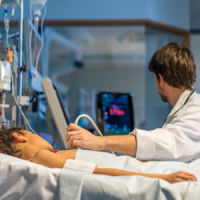Kidney injury frequently occurs in patients with septic shock and is linked to worse clinical outcomes. Administering thiamine (vitamin B1) as part of a mitochondrial resuscitation strategy might help mitigate septic kidney injury.
Thiamine is crucial for aerobic respiration, and thiamine can lead to organ dysfunction. Because the kidney contains a high concentration of mitochondria and relies on thiamine for mitochondrial respiration, there has been interest in using thiamine as a supplementary treatment to reduce kidney damage in cases of septic shock. However, research on this topic is limited, and the few studies that have explored this have yielded mixed results, although with no major safety concerns.
The TRPSS (Thiamine for Renal Protection in Septic Shock) trial aimed to evaluate whether thiamine supplementation can mitigate kidney injury in patients with septic shock. This was a multicentre, randomised, placebo-controlled clinical trial that investigated the effects of thiamine compared to a placebo in patients with septic shock. The primary outcome of the study was change in serum creatinine levels between enrolment and 72 hours after.
A total of 88 patients participated in the study, with 42 receiving thiamine and 46 receiving placebo. As per the findings of the study, at the 72-hour mark, there was no statistically significant difference in creatinine levels between the two groups. There were also no significant variations in the rates of kidney replacement therapy, acute kidney injury, or mortality between the two groups.
However, patients who received thiamine had a higher number of ICU-free days. In the subgroup of patients with thiamine deficiency, there were no significant differences in the rates of kidney failure or in-hospital mortality between the two groups.
Overall, findings from the TRPSS trial demonstrate no statistically significant difference in the primary outcome of change in creatinine levels over time. Patients who received thiamine did experience more ICU-free days, but there was no statistically significant difference in other secondary outcomes.
Source: American Journal of Respiratory and Critical Care Medicine
Image Credit: iStock


















